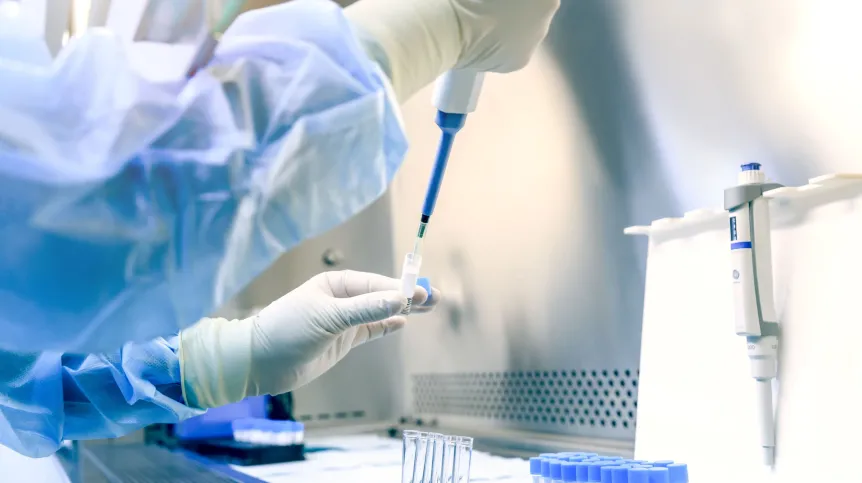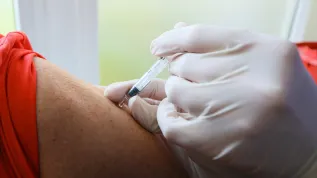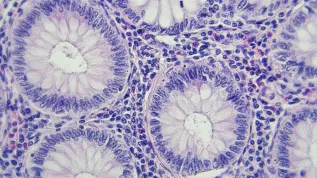
Bacterial diseases, such as tuberculosis, diphtheria or gonorrhoea, may become a serious health problem again due to the increasing phenomenon of antibiotic resistance. Researchers from the University of Warsaw are now carrying out research to identify next generation drugs that will affect the majority of the most dangerous bacteria.
In recent years, there has been a significant increase in the use of antibiotics, so large that WHO is concerned about the global threat of an increase in the number of resistant bacterial strains. Downplaying the problem and overusing antibiotics make them less and less effective. Bacteria become resistant too quickly, which will result in problems with treatment selection in bacterial infections. If the use of antibiotics continues to be so frequent, it is estimated that by 2050 bacterial diseases will cause more than 10 million deaths per year. The number of deaths will be comparable to those caused by cancer.
Dr. Maria Górna from the Biological and Chemical Research Centre and the Faculty of Chemistry of the University of Warsaw said: “Currently, the most vulnerable are patients in hospitals, who often have reduced immunity due to surgery or chemotherapy and need antibiotics the most. But in extreme case, we are primarily afraid of returning to the situation before the age of antibiotics, when any cut or viral disease could pose a risk of serious pneumonia or blood poisoning (sepsis).”
The answer to this may be new therapies that will prevent the development of dangerous pathogens. One of them is targeted protein degradation (TPD). It could be a breakthrough in the treatment of many difficult diseases. It uses degraders, next gen drugs that became famous in the world of science just a few years ago. The scientific community has high hopes for them, hoping that they will effectively help to solve the problems of diseases of very different origins, and contribute to solving the problems resulting from the increased bacterial resistance to antibiotics.
Dr. Górna, winner of L'Oréal-UNESCO For Women in Science postdoctoral fellowship, said: “Degraders are synthetic compounds that do not occur naturally in our body. They help destroy proteins responsible for the development of a disease or needed for a harmful cell's survival. By using degraders, we can target a selected protein, for example a bacterial protein, and use degraders to try to remove it and thus kill bacteria The speed and effectiveness of degraders are due to the fact that they work completely differently than traditional drugs. Unlike traditional drugs, they do not inhibit the activity of pathogenic proteins and remove them instead. Colloquially speaking, it is enough for a protein molecule to encounter degraders and they will remove it from the cell.”
Over the last decade, the concept of these drugs has been picked up by many pharmaceutical companies as they turned out to be very effective substances. There are currently many clinical trials of such compounds, including in human trials.
Górna told PAP: “They have great potential when it comes to treating neoplastic diseases, but there are also studies that show that they can remove tau protein buildup (responsible for the development Alzheimer's disease, for example), so they can be effective in the treatment of neurodegenerative diseases.”
Scientists from the University of Warsaw are among a few in the world to conduct research aimed at identifying degraders that can handle such bacterial proteins. Dr. Górna said: “Our technology is the broadest to date, it covers most of the most dangerous types of bacteria, including gram-negative bacteria resistant to many drugs.”
Bacteria resist them due to a biological mechanism. Typically, the degrader binds the malfunctioning protein to another protein (called ubiquitin ligase) and thereby degrades it in the cell, sending it to the cell's 'molecular dump'. In bacteria, this mechanism doesn't work that way. In their case, researchers search for new methods of direct degradation of the harmful protein, without the intermediary in the form of ubiquitin ligase.
The Warsaw researchers have found several such methods that, by the action of specific degraders, destroy the bacterial protein. They are now in the process of filing a patent application, so details of, for example, specific bacteria, or rather specific bacterial proteins which they want to target are not provided yet. But, according to Dr. Górna, they are based on the action of substances that are already known from the scientific literature.
She said: “The search for completely new strategies for the action of antibiotics such as antimicrobial degraders is very much needed to avoid the coming antibiotic resistance crisis. The goal of my research is to prevent this process.”
She added that since the action of degraders is irreversible, they are also effective in small amounts, which is another argument for actively searching for them.
PAP - Science in Poland, Ewelina Krajczyńska
ekr/ agt/ kap/
tr. RL













